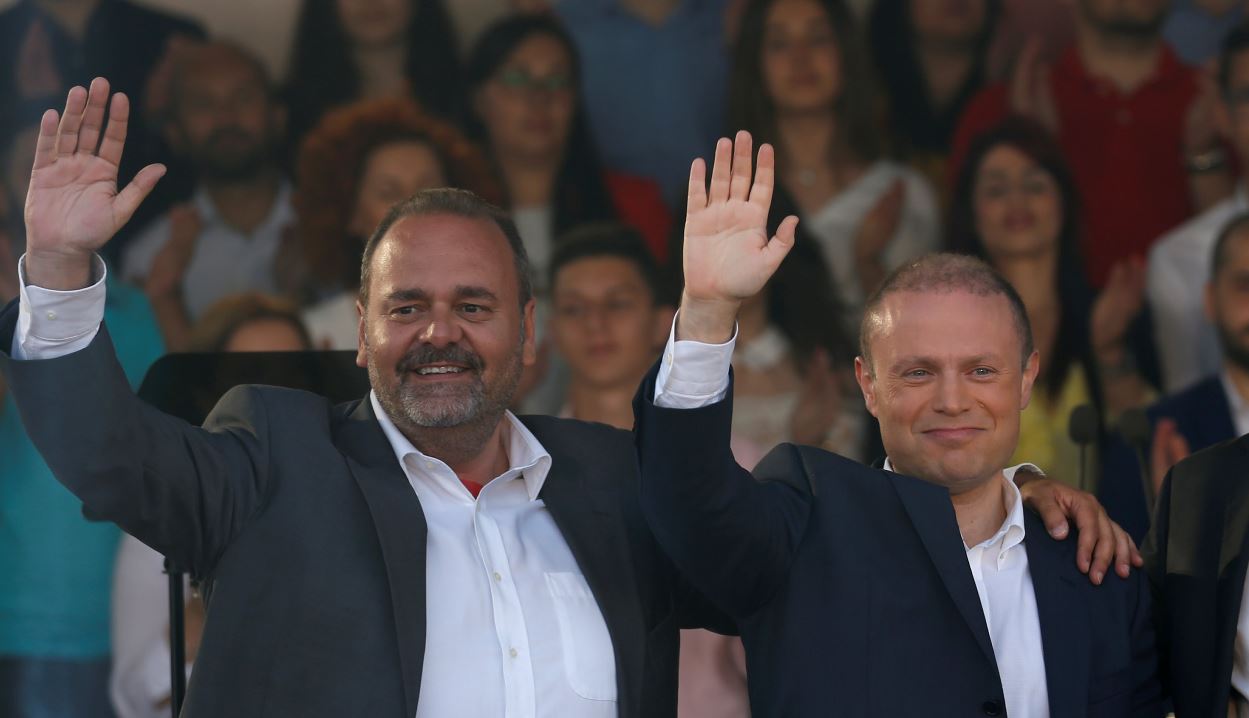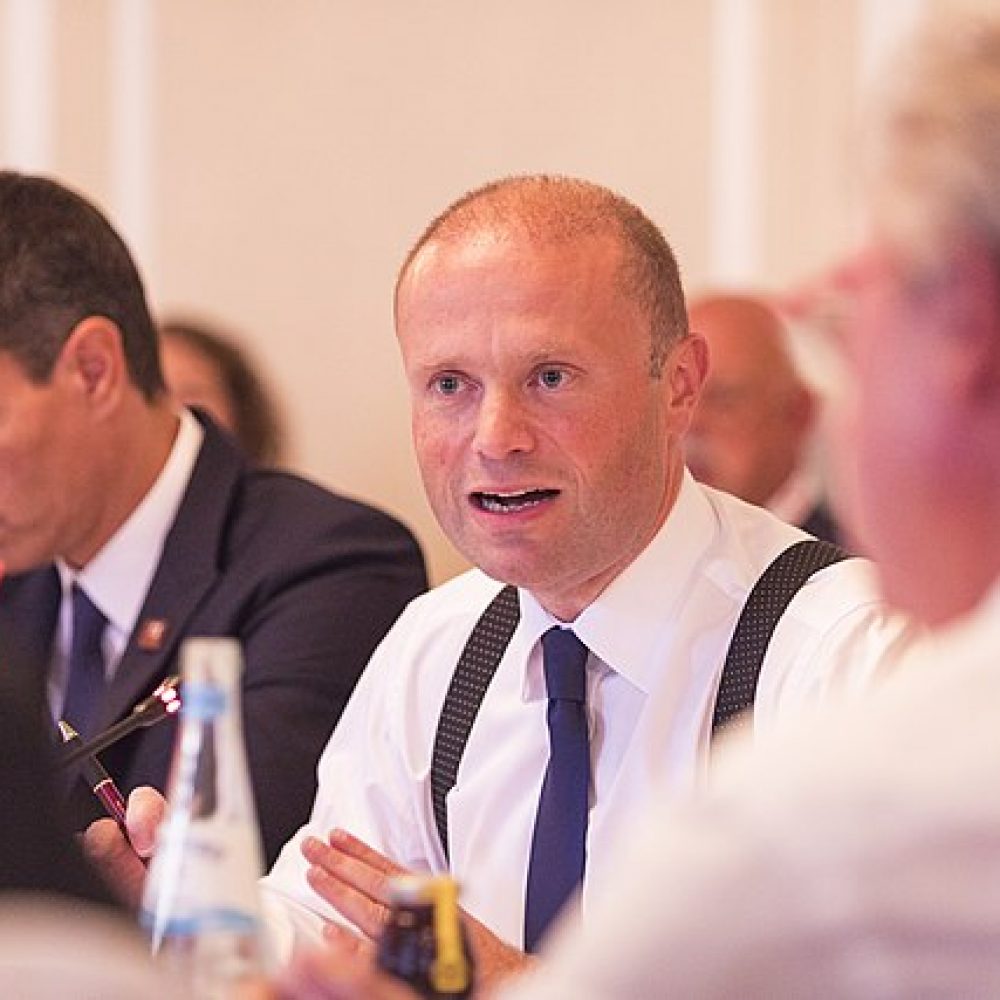The disgraced former prime minister of Malta can’t seem to decide whether a comment suggesting that his administration “blew up” journalist Daphne Caruana Galizia is libellous or whether he might better avoid taking the witness stand to be questioned about it.
The former prime minister was suing a lawyer – a vocal critic of the government – for a comment made on a year-old Facebook post.
The lawyer had shared a video interview of the former prime minister’s wife Michelle Muscat in which she said: “When I heard the news about what happened to her [Daphne Caruana Galizia], I think I was more sorry than her own family. Her family could go on to make her a saint; but at the time I said to myself: ‘Now I will have to live with her lies’.”
Above the video he shared on Facebook, lawyer Christian Grima wrote, “Your husband blew her up, Michelle. That’s what happened to her.”
It isn’t clear why Muscat waited so long to sue, or what his purpose was, but the fact that the public inquiry into the journalist’s assassination found the Maltese State — and Muscat’s entire Cabinet — responsible for her death couldn’t help his defence.
Neither could a resolution adopted by the European Parliament condemning “Labour [Party] patronage” in the journalist’s assassination.
Muscat’s libel case against the lawyer was dropped by the court when he failed to appear on three consecutive occasions at the proceedings he had instituted.
The former prime minister took to Facebook shortly afterwards, first claiming an oversight — his lawyer was abroad that day — and later insisting he was the victim of a devious legal technique used by the defence to have the case dismissed.
Muscat was making disingenuous reference to an article of civil procedure which allows the defendant to ask the court to strike off a case when the plaintiff fails to appear. Accumulated costs must then be paid by the defaulting plaintiff.
Contrary to Joseph Muscat’s victim stance, the only devious technique at play here is the tried-and-true ploy of Maltese politicians using frivolous libel suits to avoid questions and to present the illusion of innocence, only to drag the case on for years and then drop it before a resolution can be reached.
The same strategy was used by former Economy Minister Chris Cardona against the slain journalist when she reported that he had been seen at a German brothel while on EU business.

Cardona opened four libel suits against the journalist, asking the court to freeze her bank accounts up to the amount of €47,000 — a situation that persisted right up to her murder. The defendant countered by subpoenaing the minister’s mobile phone records, which would provide definitive proof of whether her claims were true.
The minister avoided and stalled, dragging the case on for over a year until it was finally dropped by the courts before the key evidence could be heard.
Daphne Caruana Galizia wasn’t alone in being targeted by such lawsuits.
Former Minister Konrad Mizzi and former chief of staff Keith Schembri dropped their suits against the then leader of the Opposition to avoid potentially damning questions under oath about offshore structures they had opened days after being elected to power.
Schembri also dropped a libel suit against The Malta Independent over an article that said one of his offshore companies received a large sum of money while he was in government.
While options should be available for individuals to defend their reputations in court — including politicians — the low bar for initiating libel suits in Malta, paired with low costs to the plaintiff and a court system where cases can take years to resolve, has made vexatious libel suits a convenient tool for those who want to intimidate journalists and silence critics.
Attempts have been made to remedy this situation. The 2018 Media and Defamation Act included defamation laws, abolished criminal libel, and absorbed slander into the action for defamation.
It also attempted to avoid disproportionate restrictions on journalists by encouraging the use of dispute resolution mechanisms such as the right of reply, voluntary clarifications, mediation, and other means of avoiding litigation.
Unfortunately, this hasn’t stopped politicians like Joseph Muscat from using the courts to pursue his critics — courts to which he had the power to appoint judges.
The board of the public inquiry into Daphne Caruana Galizia’s assassination has called for improvements to the Media Defamation Act “to eliminate the possibility of frivolous libel cases filed against journalists by public office holders who have a duty to defend the right to free expression.”
It is also said, “there are no grounds for libel lawsuits against journalists to continue after their death.”
Yet the former prime minister still refuses to retract his libel suit against the slain journalist four years after she was brutally murdered on his watch, and that suit has now been passed to her family.
Full implementation of the public inquiry’s conclusions would go a long way towards improving the safety of journalists in Malta while ensuring that citizens have full access to information that is in the public interest.
Unfortunately, nothing has been done to implement those recommendations more than four months after the conclusions were published, and Prime Minister Robert Abela has not committed to a timeline for doing so, saying his government is holding meetings with stakeholders to discuss them.
The following project is weekly Maltese Roundups prepared by The Shift News (Malta) offering the latest news in the Daphne Caruana Galizia case.

